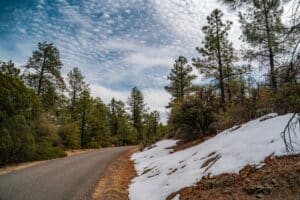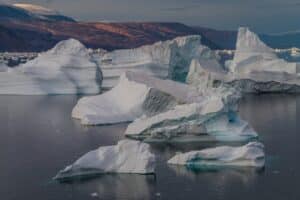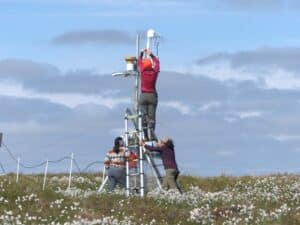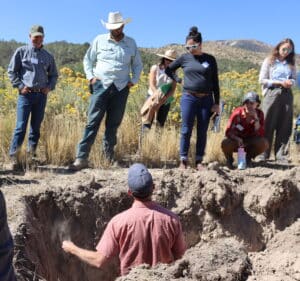Study finds lands used for grazing can worsen or help climate change
Too much livestock on a given amount of land can lead to carbon losses, but appropriate numbers can actually help sequester the carbon.

When it comes to global climate change, livestock grazing can be either a blessing or a curse, according to a new study, which offers clues on how to tell the difference.
If managed properly, the study shows, grazing can actually increase the amount of carbon from the air that gets stored in the ground and sequestered for the long run. But if there is too much grazing, soil erosion can result, and the net effect is to cause more carbon losses, so that the land becomes a net carbon source, instead of a carbon sink. And the study found that the latter is far more common around the world today.
Long-term research highlights environmental impact of agriculture
Study carried out in ten micro-basins of the Xingu River, in Mato Grosso

How to reconcile the expansion of agricultural frontiers with the maintenance of the basin landscape and the integrity of the hydrological cycle, which are so necessary for human life? And how does all this have to do with food security? The search for these answers led researcher Márcia Macedo to develop, together with other researchers, a long-term study in ten micro-basins of the Xingu River, in Mato Grosso.
It was through the Tanguro Project, an initiative of the Amazon Environmental Research Institute (Ipam) in the city of Querência, that the researcher found the perfect environment to develop her first experiment in search of these answers. In an open-air laboratory, which brings together researchers from several countries, Márcia also had access to watercourses located on land with different uses. “It’s a place where we can compare forested basins, that is, integral ones, and basins with intensive agriculture. So we researched four basins for forestry and six basins for agriculture,” she explains.
Scientists from Woodwell Climate Research Center are among the 195 leading experts in forest ecosystems, climate change, and the carbon cycle who have come together to urge the Biden Administration to immediately declare a moratorium on all logging in mature and old-growth forests on federal lands. The signers include seven members of the National Academies of Sciences and some of the most notable names in climate science.
The letter comes amid growing concerns within the scientific community around the U.S. Forest Service and Bureau of Land Management’s response to an executive order, issued by the Biden Administration on Earth Day 2022, to establish guidelines and best practices to safeguard mature and old-growth forests on federal lands. The letter was initiated by Dr. Beverly Law, Professor Emeritus at Oregon State University, and Dr. Bill Moomaw, Professor Emeritus at Tufts University and Distinguished Visiting Scientist at Woodwell Climate. Last week, Woodwell Climate Senior Scientist and signatory Dr. Rich Birdsey delivered the letter’s message to the Mature and Old Growth Science Summit, hosted by the Forest Stewards Guild, the U.S. Forest Service, and the Society of American Foresters.
“Old-growth forests are made up of our oldest, and typically largest, trees that store massive amounts of carbon,” said Dr. Rich Birdsey. “We need to protect old growth, as well as younger mature forests that can attain old-growth characteristics with time.”
“The carbon storage function these forests play is essential to our efforts to reduce carbon emissions and mitigate the impacts of the rapidly changing climate, yet millions of acres of mature and old-growth forests stand on federal lands that are vulnerable to logging,” said Dr. Beverly Law. “To align with the United States’s commitments to ending global forest deforestation and degradation, we must urgently halt any additional logging of these critical natural resources.”
The scientists point to recent efforts by the agencies to increase timber sales and logging of these forests rather than increasing their protection as directly contrary to these objectives, and call on President Biden to issue a new executive order prohibiting activities that further forest degradation in the short-term, while the Administration works, in partnership with policy and climate leaders, to develop and implement effective, long-term management policies. Reducing timber harvesting of carbon-dense forests can have an immediate effect of lowering emissions and is the most significant action that the U.S. can take to immediately limit greenhouse gasses.
“With their 2022 executive order to protect mature and old-growth forests, the Biden Administration laid the groundwork for the U.S. to emerge as a global leader in conserving these forests and making good on international climate commitments,” said Dr. William Moomaw. “Halting logging in the interim is necessary to protect these resources now, while also working with the agencies to develop strong, long-term policies consistent with the Administration’s commitments to addressing climate change and safeguarding forests as a natural climate solution.”
The full letter can be found here.
Last month was hottest February ever recorded. It’s the ninth-straight broken record

For the ninth straight month, Earth has obliterated global heat records — with February, the winter as a whole and the world’s oceans setting new high-temperature marks, according to the European Union climate agency Copernicus.
The latest record-breaking in this climate change-fueled global hot streak includes sea surface temperatures that weren’t just the hottest for February, but eclipsed any month on record, soaring past August 2023’s mark and still rising at the end of the month. And February, as well the previous two winter months, soared well past the internationally set threshold for long-term warming, Copernicus reported Wednesday.
Continue reading on Associated Press News.
Study pinpoints links between melting Arctic ice and summertime extreme weather in Europe
New research shows how last year’s warming melted ice in Greenland that increased flows of fresh, cold water into the North Atlantic, upsetting ocean currents in ways that lead to atmospheric changes.

The Arctic Ocean is mostly enclosed by the coldest parts of the Northern Hemisphere’s continents, ringed in by Siberia, Alaska and the Canadian Arctic, with only a small opening to the Pacific through the Bering Strait, and some narrow channels through the labyrinth of Canada’s Arctic archipelago.
But east of Greenland, there’s a stretch of open water about 1,300 miles across where the Arctic can pour its icy heart out to the North Atlantic. Those flows include increasing surges of cold and fresh water from melted ice, and a new study in the journal Weather and Climate Dynamics shows how those pulses can set off a chain reaction from the ocean to the atmosphere that ends up causing summer heatwaves and droughts in Europe.
Read more on Inside Climate News.
How poop turns into forests
Did you know the world’s largest tropical forest is partly formed by seeds emerging from poop? Ecologist Ludmila Rattis reveals the surprisingly fruitful benefits of letting nature take care of its own business, sharing how the digestive habits of tapirs — pig-like creatures that roam Amazonia — spread seeds that help regenerate the forest and promote climate resilience worldwide. (Even nature’s waste is put to good use!)
Freeze on Russian collaboration disrupts urgently needed permafrost data flow

Warming temperatures in the Arctic are accelerating the thaw of carbon-rich permafrost and threatening to add massive amounts of carbon dioxide and methane to an atmosphere already overheating from the buildup of anthropogenic greenhouse gas emissions.
More than half that permafrost lies beneath remote Russian soil, where scientists have long worked in an international research community that freely shared its field stations, climate sensors and data sets to better understand the rapidly changing polar region’s planetary impacts.
Researchers are especially eager to know when a dangerous tipping point may be reached that would trigger the release of vast amounts of greenhouse gases stored in frozen soils.
But then came the Russian invasion of Ukraine on Feb. 24, 2022, and all that cooperation came to a halt, part of the fallout of Western sanctions on Russia. Since then, international researchers outside Russia have applied creative workarounds in order to continue their research, but problems remain.
How much carbon can farmers store in their soil? Nobody’s sure.
Advocates say the long-awaited farm bill could help fix that.

Dirt, it turns out, isn’t just worm poop. It’s also a humongous receptacle of carbon, some 2.5 trillion tons of it — three times more than all the carbon in the atmosphere.
That’s why if you ask a climate wonk about the U.S. farm bill — the broad, trillion-dollar spending package Congress is supposed to pass this year (after failing to do so last year) — they’ll probably tell you something about the stuff beneath your feet. The bill to fund agricultural and food programs could put a dent in the country’s greenhouse gas emissions, some environmental advocates say, if it does one thing in particular: Help farmers store carbon in their soil.
The problem is, no one really knows how much carbon farmers can store in their soil.



